What’s Our TOP Interview Tip You Say? “Know Your Experience!” (It’s That Simple)
Today, we are going to be talking about why “knowing your experience” will make such a difference in your future interviews and how you can find and remember your experience prior to your interview.
Watch our video and read our blog below to find out more!
I am going to presume you have all the basic stuff covered i.e. research the company, turn up on time, dress in a way that makes you feel smart and confident when you look in the mirror and in your judgement, is appropriate for the business environment you are meeting in.
Interview advice is a regularly covered topic, advice like monitoring the body language of the interviewer, responding to questions with the STAR approach, having a long list of pre prepared questions and being armed with scripted responses to certain questions and while well-meaning and valid, the over complexity can create more tension in the interview and perhaps sets you up for a less successful interview as it requires you to think about too many factors in an already pressurised scenario.
At Middleton’s Assured Talent, we have found from years of experience helping people to successfully find their next job, being able to talk about the specifics of what they have done previously, in a relaxed and natural way, has been the most consistent success factor during an interview process.
So why does knowing your experience make such a difference in an interview?
Being able to be specific about tasks you have previously completed has a far greater impact than a general response. Provide specific examples even if they are not asked for example- “It’s like the time I successfully made X. Being armed with these examples of your experience in your memory means you don’t have to spend time preparing specific responses to questions that may or may not be asked. Knowing your experience will help you answer most questions as the likelihood is that you will have done something similar previously. And if you can’t answer, explain how you approach a new situation whenever you meet one. For example- “I would seek knowledge from Y or advice from Z.”
If you don’t over complicate your interview preparation, nor your strategy for the interview itself, you will be much more relaxed and you WILL perform better. You will listen more and you will ask the right and natural questions, showing inquisitiveness and enthusiasm because you are not trying to remember pre prepared responses.
So how do you find out and remember your experience in preparation for your interview?
- Start by reading your CV and look at older versions you have kept in case there are some interesting and relevant examples of your experience that are long forgotten.
- Look at the job spec for your current role (if you have one available), it will refresh your memory of all the different tasks and responsibilities you currently have.
- Write down a list of some of the projects you have delivered in the last 3 – 5 years, particularly those that feel most relevant to the job you are interviewing for or that you feel best demonstrate your abilities. Write down a simple title for each, a rough time frame and a few words that set the high level context of what the project was. Then go through each in your mind and visualise what the process of delivering that project was, what went well, what went badly, what did you learn, what was the outcome, what excited you about the work and what was stressful about it. You might not need to write down this level of detail as most of us can probably relive the details of a project in our minds and be able to discuss it in detail in an interview a few days later. If your job is not project based, you can apply the same approach for job tasks, management or relationship scenarios, sales scenarios and any sort of work related output or achievement.
- Speak to colleagues. Perhaps not always easy but take the opportunity to relive a shared achievement with a colleague, they may remind you of factors you have forgotten.
- Look at old appraisals, particularly good for arming your memory with successes, strengths and areas of development.
- Look at old pieces of work, it might be a piece of software you developed or perhaps a project plan you created, depending on your vocation.
Good Luck in your future interviews. If you would like to discuss how Middletons Assured Talent can help you further, please feel free to contact us at- talent@middletonsassured.com
Tags: advice, interview, job seeking, recruiter, top tip
Trackback from your site.
